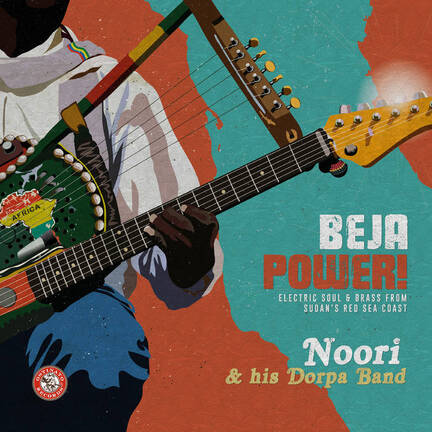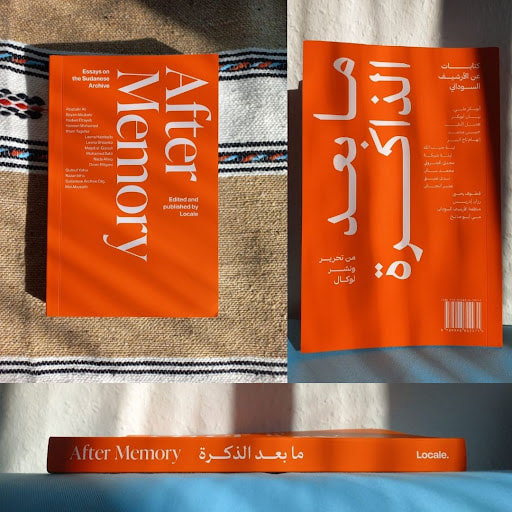|
Mihera Abdel Kafi  Album cover. (c) Ostinato records Album cover. (c) Ostinato records Following the release of “Abu Obaida Hassan & His Tambour: The Shaigiya Sound of Sudan” and “Two Niles to Sing a Melody: The Violins & Synths of Sudan”, Ostinato Records is on the cusp of releasing its third Sudanese record: Beja Power! Electric Soul & Brass from Sudan’s Red Sea Coast by Noori & His Dorpa Band. The album, which was recorded in Omdurman, Sudan, will be fully released on bandcamp this week, on June 3, 2022, and elsewhere on June 24, 2022. For now, a song, Al Almal, can already be heard here. Ostinato Records announced the album as follows: “The first ever international release of the Beja sound, performed by Noori and his Dorpa Band, an unheard outfit from Port Sudan, a city on the Red Sea coast in eastern Sudan and the heart of Beja culture." It's worth noting here that though Ostinato Records, a New York City-based label, has been introducing stunning music from around the globe to an international (read: western) market, the label has a tendency to reproduce the "western gaze" in its marketing material. For example, when it writes that Noori and his Dorpa Band are "unheard" , we assume they mean unheard by non-Sudanese ears, since these musicians have been performing in Sudan for years. As an indigenous people, the Beja trace their presence on the land along the Red Sea coast back millennia. As such, Beja melodies have changed and evolved over many generations. The Beja featured quite significantly in the British colonial imagination as "noble savages". This was embodied in Rudyard Kiplings' poem "Fuzzy-Wuzzy" (1892), describing a battle between British soldiers, who entered Sudan as part of the imperial Sudan Expeditionary Force, and Beja (specifically Hadendawa) warriors. The force attempted to conquer Sudan in the late 19th century but initially failed, driven back by Sudanese Mahdist forces, including Beja Hadendawa warriors, at the battle of Suakin. One of the verses of the poem describe the Beja warriors, which the British nicknamed "Fuzzy-Wuzzy" (a racist slur used to mock Black people's hair) as "a pore benighted 'eathen but a first-class fightin' man;" Noori believes an unleashing of Beja music would form the most potent act of resistance in the Beja's quest for equity and justice.The neglect and contempt towards Beja communities continued in the post-colonial period after 1956. As such, the Beja have been active in demanding political change in Sudan for decades, confronting the way in which Sudanese governments have turned a blind eye to their calls for recognition and for access to the wealth of gold found in their soil. Noori believes an unleashing of Beja music would form the most potent act of resistance in the Beja's quest for equity and justice.
To learn more about the history of the album, but also about the amazing musicians behind it, you can read the following articles written by Noori himself for Africa Is a Country and by Ostinato’s founder, Vik Sohonie, for OkayAfrica. To listen to or purchase Beja Power! Electric Soul & Brass from Sudan’s Red Sea Coast, visit Ostinato Records’ Bandcamp
0 Comments
Mihera Abdel Kafi"This book examines the processes and mechanics of the archive: its making, its necessity, and its function in informing the future within different practices and professions. It is not only about the different journeys that the archive takes, but the different journeys that lead us, as individuals, to the archive.”-After Memory, 2021  The Locale team, composed of Aala Sharfi, Nafisa Eltahir, Qutouf Yahia and Rund Alarabi simply never disappoints. The self-described female-led platform formed in 2016 that aims to develop and support homegrown Sudanese creative efforts, recently issued the anthology After Memory — a unique collection of essays on Sudanese history, politics, culture, art and much more. Fifteen essays, each relatively short, organized in three parts, address the topic of the Sudanese archive, which for the authors is understood "as a medium of service and future-making rather than as a vessel for nostalgia". In the first part of the collection, titled “Critique”, the essays explore, among other things, what it means to search for Sudanese history in archives in Sudan and abroad, what roles anecdotes play in the writing of history, what architecture and urban planning tell us about the archive, and who is telling these stories in the first place. This first part critically engages with what it means to be writing about a (post)colonial Sudan and a young country in which most of the population is under the age of 25, about preserving and shaping this country’s own identity, but also about female representation and visibility in this archive. The second part, “Encounter”, deals mostly with the Sudanese Revolution that started in December 2018, as captured in various photographs, pictures, videos but also preserved through music and poetry. The last part, “Construct”, is dedicated to the many things that at first glance can hardly be understood as archives. From rather more plausible things, like Sudanese cuisine, to the construction project of Sudanese Sport City (SSC), the ancient Sudanese practices of Zar, the history of Sudanese physicians’ struggles with previous and current regimes , and Khartoum’s deathscapes, one understands how all these things can map part of an overall history. The point this section of After Memory makes is that not only visible things like buildings or artworks make up the archive; rather, supposedly non-visible, non-graspable things — a real-life encounter, traditions, people’s struggles and habits — all should be archived. The remarkable thing about After Memory is not only the beautiful collection of valuable stories, but also the many images it makes available. The book is fully bilingual (English and Arabic) and has been put together exclusively by a Sudanese team. Notably, it is also cataloged in the National Library of Sudan, an act that is symbolic as well as practical, given the neglect and hostility with which public libraries in Sudan have been met during the 30 years of Omar alBashir’s brutal regime. After Memory is a product of the exhibition “This Will Have Been: Archives of the Past, Present, and Future” that Locale held in Khartoum at the end of 2019. As Locale writes: “This book examines the processes and mechanics of the archive: its making, its necessity, and its function in informing the future within different practices and professions. It is not only about the different journeys that the archive takes, but the different journeys that lead us, as individuals, to the archive.” The different articles were written by Bayan Abubakr, Magdi el-Gizouli, Leena Shibeika, Razan Idris, Hadeel Eltayeb, Haneen Mohamed, the Sudanese Archive Organization, Leena Habiballa, Mohamed Satti, Qutouf Yahia, Omer Eltigani, Abubakr Ali, Nada Atieg, Ilham Tagelsir and Mai Abusalih. After Memory can be purchased for 30$ (+shipping) directly through Locale’s linktree, where you can also listen to a playsit of music and sounds put together by Haneen. |

 RSS Feed
RSS Feed